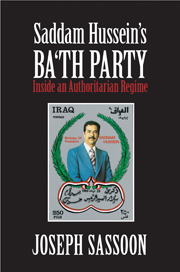Book contents
- Frontmatter
- Contents
- List of Figures and Tables
- Acknowledgments
- Note on Transliteration
- List of Abbreviations
- Glossary
- Map
- Introduction
- 1 The Rise of the Baʿth Party
- 2 Party Structure and Organization
- 3 The Baʿth Party Branches
- 4 Security Organizations during the Baʿth Era
- 5 The Baʿth Party and the Army
- 6 The Personality Cult of Saddam Hussein
- 7 Control and Resistance
- 8 Bureaucracy and Civil Life under the Baʿth
- Conclusion
- Appendix I Chart of the Structure of the Baʿth Party Secretariat (maktab amanat sir al-qutr)
- Appendix II Baʿth Party Statistics as of September 2002
- Notes on Sources
- Bibliography
- Index
- References
4 - Security Organizations during the Baʿth Era
Published online by Cambridge University Press: 05 June 2012
- Frontmatter
- Contents
- List of Figures and Tables
- Acknowledgments
- Note on Transliteration
- List of Abbreviations
- Glossary
- Map
- Introduction
- 1 The Rise of the Baʿth Party
- 2 Party Structure and Organization
- 3 The Baʿth Party Branches
- 4 Security Organizations during the Baʿth Era
- 5 The Baʿth Party and the Army
- 6 The Personality Cult of Saddam Hussein
- 7 Control and Resistance
- 8 Bureaucracy and Civil Life under the Baʿth
- Conclusion
- Appendix I Chart of the Structure of the Baʿth Party Secretariat (maktab amanat sir al-qutr)
- Appendix II Baʿth Party Statistics as of September 2002
- Notes on Sources
- Bibliography
- Index
- References
Summary
The survival of the Baʿth Party and its leadership under Saddam Hussein can be largely attributed to the party's ability to expand and control its security apparatus. This system was established long before 1968, but Saddam Hussein perfected its working arrangements and utilized it in ways previously unknown in the history of Iraq. The security agencies were designed to overlap and were structured so as to ensure that no one agency would become strong enough to threaten the regime.
During the years 1968–2003 four main agencies operated in Iraq:
Al-amn al-ʿam (General Security) was the oldest agency, dating back to the British mandate in 1921. It underwent dramatic changes in 1973 after its head, Nadhim Kazzar, attempted a coup against both President Hasan al-Bakr and the then Vice President Saddam Hussein. The failed plot led Saddam Hussein to rethink his strategy for the security apparatus, which was part of his responsibility. The eighth regional conference of the Baʿth Party in 1974 admitted that al-amn had made many mistakes, such as lack of real control over the security system, and that it was not enough to rely on party members in these organizations. Al-amn monitored domestic opposition groups, ethnic minorities, and religious factions; it was responsible for patrolling Iraq's borders, particularly in the north, and it kept an eye on illegal economic activities such as currency trading and dealings in the black market.
Al-istikhbarat al-ʿaskariyya al-ʿamma (General Military Intelligence) was also established when Iraq became independent in 1932 but was reorganized after Saddam Hussein became president in 1979. This agency collected intelligence on the military capabilities of countries bordering Iraq, as well as on Kurdish forces. Besides gathering information, it acted as an internal force to detect enemy “infiltration” of the army by placing intelligence officers in every military unit down to battalion level. In addition, it gathered information on Iraqi political dissidents abroad and monitored the activities of foreign military attachés in Iraq. In Kurdistan, the agency had unlimited authority to combat Kurdish insurgents. Although headquartered in the Ministry of Defense, the agency reported directly to the president.
Jihaz al-mukhabarat al-ʿIraqiyya (the Iraqi Intelligence Service [IIS]) evolved from the internal security apparatus of the Baʿth that was created after the party rose to power in 1963 and was originally called jihaz hunain. Saddam Hussein, then deputy secretary of the party and vice president as well as in charge of all security agencies, dissolved jihaz hunain in 1973 and set up the IIS. According to Kanan Makiya, the IIS was distinctly different from other security organs in that it was more of a “political body” and its first members “combined professional inexperience with political knowledge, not mere loyalty.” The organization kept tabs on Baʿth Party members, monitored the activities of Iraqi students abroad, targeted operations against foreign intelligence services, and from 1997 was used for illegal procurement for the Military Industrial Commission. The IIS's regional offices in nine provinces carried out miscellaneous functions for its directorates.
Jihaz al-amn al-khass (the Special Security Organization [SSO]) was set up by Saddam Hussein after he became president and was in essence the leadership's eyes and ears. It was the most powerful of all the agencies and reported directly to Saddam Hussein. Hussein Kamil al-Majid, Saddam's son-in-law and nephew of ʿAli Hasan al-Majid (known as Chemical ʿAli), was instrumental in its organization, and Saddam's son Qusay became its director sometime in late 1991, thus strengthening the SSO's direct access to the president. The documents of the BRCC provide an unprecedented insight into the workings of this organization.
- Type
- Chapter
- Information
- Saddam Hussein's Ba'th PartyInside an Authoritarian Regime, pp. 95 - 128Publisher: Cambridge University PressPrint publication year: 2011



